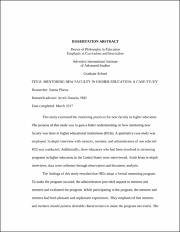Mentoring new faculty in higher education : a case study
Abstract
This study examined the mentoring practices for new faculty in higher education. The purpose of this study was to gain a better understanding on how mentoring new faculty was done in higher educational institutions (HEIs). A qualitative case study was employed. In-depth interview with mentors, mentees, and administrators of one selected HEI was conducted. Additionally, three educators who had been involved in mentoring programs in higher education in the United States were interviewed. Aside from in-depth interviews, data were collected through observation and document analysis.
The findings of this study revealed that HEIs adapt a formal mentoring program. To make the program succeed, the administrators provided support to mentors and mentees and evaluated the program. While participating in the program, the mentors and mentees had both pleasant and unpleasant experiences. They emphasized that mentors and mentees should possess desirable characteristics to make the program successful. The
participants also perceived some barriers to mentoring, which could be overcome by mentors and mentees making time for mentoring and being motivated, among others. The participants and the mentoring experts asserted that HEIs could successfully implement a mentoring program through active involvement of administrators, mentors, and mentees. Administrators should develop human resources, create an institutional structure for mentoring, and provide financial support and instructional resources. Secondly, mentors and mentees must develop positive relationships with, and learn from each other.
In the case of HEIs, the mentoring relationships that transpire between mentors and mentees are collegial in nature. The mentees learn from the mentors, and the mentors learn from the mentees as well. Aligned to the colegial culture of academic settings, specifically of higher education, the mentoring program in HEIs reflects the commitment of the institution and the faculty to encourage each other’s professional and personal growth. Further research on mentoring of new faculty in HEIs may be conducted. Due to very limited research on mentoring done in the Philippines and Adventist educational institutions, such studies is needful.


